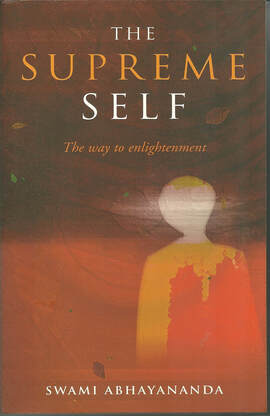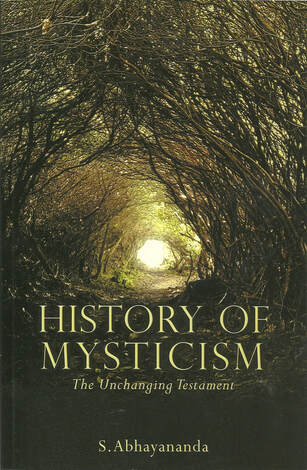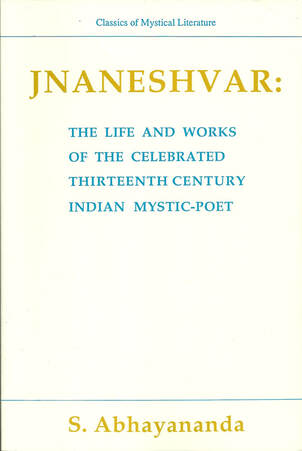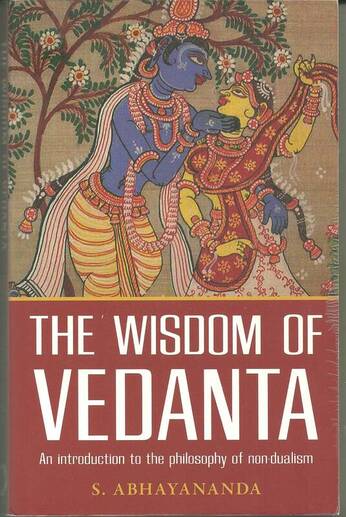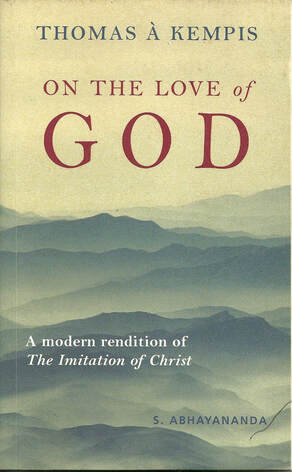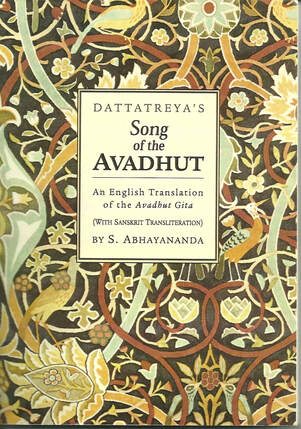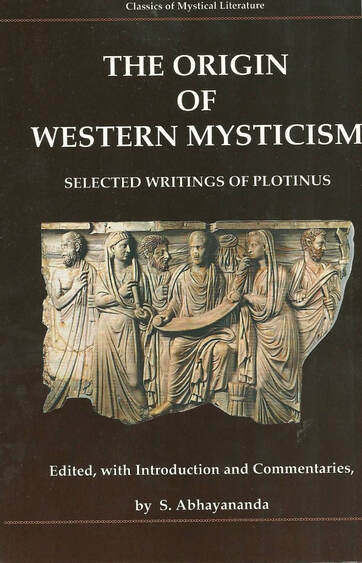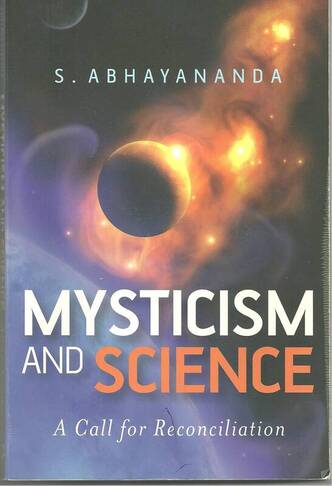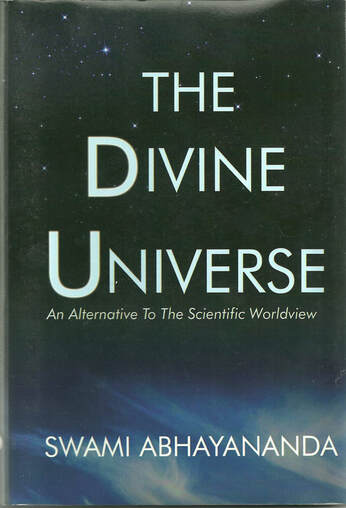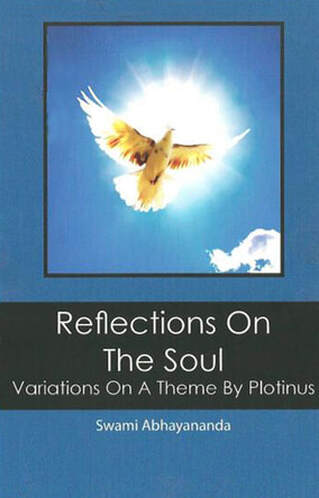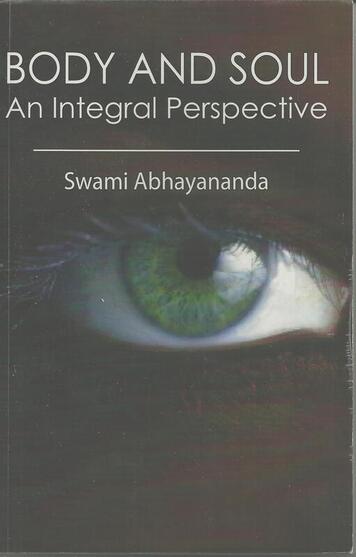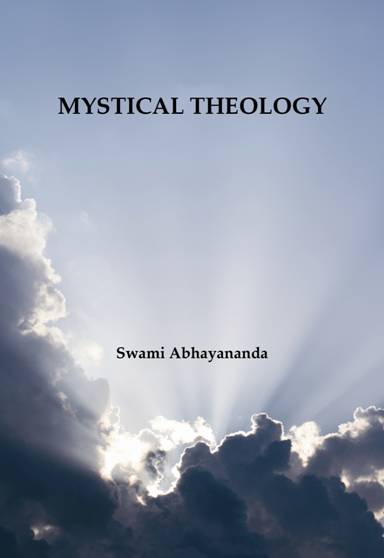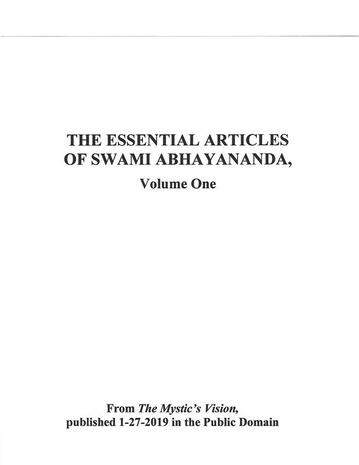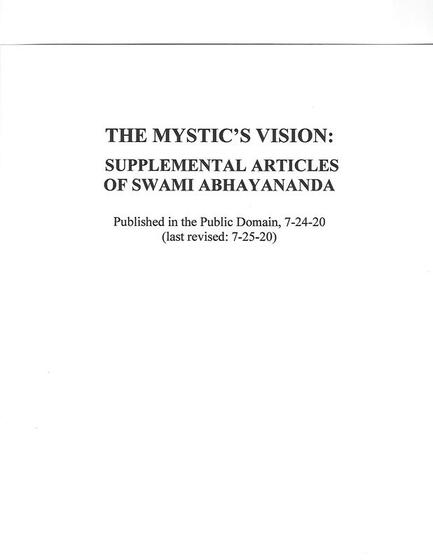THE MYSTIC'S VISION
Book Catalog
Here is a listing of the books I have written and published:
The Supreme Self is my first book, published with my own imprint, Atma Books, in 1984. It is my spiritual autobiography; it tells the story of my awakening, my retreat to an isolated cabin in the woods, and my subsequent spiritual realization.
This book was republished by O Books in 2005, and went Out-of-Print in 2012. As of September 28, 2012, this book is available as a free ebook in PDF format on the Read Or Download Books page of this website.
From the Back Cover:
The Supreme Self is an inspirational masterpiece for our times. It is at once the dramatic personal story of one man's experience of revelation and a modern testament affirming the universal and perennial "philosophy of unity" expounded by the genuine mystics and seers of every religious tradition since time began.
In this profound spiritual autobiography, Swami Abhayananda takes us along on his solitary search and subsequent Self-realization, establishing the irrefutable fact of man's divine nature, and reaffirming the power of grace and devotion in the lives of those seeking "the vision of God", the liberating knowledge of one's own divine Self. Elevating and ennobling, this revelation of mystical vision will inspire generations,, and stand alongside the great classics of mystical literature in the tradition of Plotinus, Eckhart, and John of the Cross.
From the Back Cover:
The Supreme Self is an inspirational masterpiece for our times. It is at once the dramatic personal story of one man's experience of revelation and a modern testament affirming the universal and perennial "philosophy of unity" expounded by the genuine mystics and seers of every religious tradition since time began.
In this profound spiritual autobiography, Swami Abhayananda takes us along on his solitary search and subsequent Self-realization, establishing the irrefutable fact of man's divine nature, and reaffirming the power of grace and devotion in the lives of those seeking "the vision of God", the liberating knowledge of one's own divine Self. Elevating and ennobling, this revelation of mystical vision will inspire generations,, and stand alongside the great classics of mystical literature in the tradition of Plotinus, Eckhart, and John of the Cross.
History of Mysticism was first published by me (Atma Books) in 1987, and is a unique compendium of the lives and teachings of the world's best known mystics. The lives and teachings of these mystics are presented in chronological order, and include representatives of every religious tradition, revealing the broad universality of genuine religious experience.
This book was republished in 2002 by Watkins Publishing, but is now out
of print. However, an expanded and revised Thirtieth Anniversary edition
is available on Kindle and as a free downloadable PDF document on this website at the
Read Or Download Books page. This book is fundamental for seasoned scholars of philosophy and religion as well as those new to the study of Mysticism. Here is a reproduction of the Table of Contents of History
of Mysticism:
Preface
Introduction
I. Mystics of The Ancient Past
Pre-history Of Mysticism
Vedic Hymnists
Early Egyptians
The Early Jews
Upanishadic Seers
Kapila
The Bhagavad Gita
The Taoist Sages
The Buddha
II. Mystics of The Greco-Roman Era
The Pre-Socratic Greeks
Socrates And His Successors
Zeno of Citium
Philo Judaeus
Jesus of Nazareth
Early Christians
The Gnostics
The Hermetics
Plotinus
III. Mystics of The Early Middle Ages
Pseudo-Dionysius
Narada
Patanjali
The Tantra
Shankara
Dattatreya
Milarepa
The Ch’an And Zen Buddhists
The Sufis
Al-Hallaj
IV. Mystics of The Late Middle Ages
Jewish Mysticism
Ibn Arabi
Iraqi
Rumi
Jnaneshvar
Medieval Christians
Meister Eckhart
Thomas á Kempis
V. Mystics of The Modern Era
Nicholas of Cusa
Juan de la Cruz (St. John of the Cross)
Kabir
Nanak
Dadu
Seventeenth And Eighteenth Century Mystics
Sri Ramakrishna
Ramana Maharshi
Swami Rama Tirtha
Twentieth Century Mystics
Conclusion
About The Author
Notes
Bibliography
Illustrations
of print. However, an expanded and revised Thirtieth Anniversary edition
is available on Kindle and as a free downloadable PDF document on this website at the
Read Or Download Books page. This book is fundamental for seasoned scholars of philosophy and religion as well as those new to the study of Mysticism. Here is a reproduction of the Table of Contents of History
of Mysticism:
Preface
Introduction
I. Mystics of The Ancient Past
Pre-history Of Mysticism
Vedic Hymnists
Early Egyptians
The Early Jews
Upanishadic Seers
Kapila
The Bhagavad Gita
The Taoist Sages
The Buddha
II. Mystics of The Greco-Roman Era
The Pre-Socratic Greeks
Socrates And His Successors
Zeno of Citium
Philo Judaeus
Jesus of Nazareth
Early Christians
The Gnostics
The Hermetics
Plotinus
III. Mystics of The Early Middle Ages
Pseudo-Dionysius
Narada
Patanjali
The Tantra
Shankara
Dattatreya
Milarepa
The Ch’an And Zen Buddhists
The Sufis
Al-Hallaj
IV. Mystics of The Late Middle Ages
Jewish Mysticism
Ibn Arabi
Iraqi
Rumi
Jnaneshvar
Medieval Christians
Meister Eckhart
Thomas á Kempis
V. Mystics of The Modern Era
Nicholas of Cusa
Juan de la Cruz (St. John of the Cross)
Kabir
Nanak
Dadu
Seventeenth And Eighteenth Century Mystics
Sri Ramakrishna
Ramana Maharshi
Swami Rama Tirtha
Twentieth Century Mystics
Conclusion
About The Author
Notes
Bibliography
Illustrations
Jnaneshvar: The Life And Works of The Celebrated Thirteenth Century Indian Mystic-Poet tells the story of Jnaneshvar, a thirteenth century mystic-poet whose life and writings are distinctively unique and original, possessing a rare power to inspire and illumine future generations. This book contains complete English translations of his Amritanubhav, Haripatha, and Changadeva Pasashti. It was originally published by Atma Books in 1994.
Jnaneshvar is currently out of print and unavailable in the U.S. marketplace. However, this book is available in PDF format on the Read Or Download Books page.
From the Back Cover:
Jnaneshvar: The Life And Works tells the story of the life and career of Jnaneshvar, who emerges as one of the most brilliant poets, sublime mystics, and fascinating figures in all of Medieval Indian history. At an age when most men have scarcely begun their life's work, Jnaneshvar, who lived from 1271 to 1296 — a mere span of twenty-five years — had ended his; but not before having built an everlasting monument to his memory in the written masterpieces he left behind. In so few years, he had established a legacy that was to revitalize his culture, his language, his religious tradition, and make a place for himself as an enduring presence in the hearts of his countrymen for all time.
The reason for his enduring popularity in his own homeland becomes evident when one discovers his written works. Even in English translation, the profundity of his thought, the rich profusion of his imagery, and the unmistakeable style of his homespun wisdom at so tender an age, distinguish his works as those of a unique genius. The complete works included here in translation are: Amritanubhav, The Nectar Of Mystical Experience"; Haripatha, "Sing The Name of Hari"; and Changadev Pasashti, "Letter To Changadev".
From the Back Cover:
Jnaneshvar: The Life And Works tells the story of the life and career of Jnaneshvar, who emerges as one of the most brilliant poets, sublime mystics, and fascinating figures in all of Medieval Indian history. At an age when most men have scarcely begun their life's work, Jnaneshvar, who lived from 1271 to 1296 — a mere span of twenty-five years — had ended his; but not before having built an everlasting monument to his memory in the written masterpieces he left behind. In so few years, he had established a legacy that was to revitalize his culture, his language, his religious tradition, and make a place for himself as an enduring presence in the hearts of his countrymen for all time.
The reason for his enduring popularity in his own homeland becomes evident when one discovers his written works. Even in English translation, the profundity of his thought, the rich profusion of his imagery, and the unmistakeable style of his homespun wisdom at so tender an age, distinguish his works as those of a unique genius. The complete works included here in translation are: Amritanubhav, The Nectar Of Mystical Experience"; Haripatha, "Sing The Name of Hari"; and Changadev Pasashti, "Letter To Changadev".
The Wisdom of Vedanta is a collection of thirty-five lectures given over a several year period on India's principal nondual philosophy. Each lecture illumines a separate aspect of that philosophical tradition.
The Wisdom of Vedanta was originally published by Atma Books in 1991, and was republished by O Books in 2006. As of April, 2013, it is Out of Print, but
is currently available as a free downloadable ebook (revised and reformatted January, 2018) in PDF format on myRead Or Download Books page.
From the Back Cover:
Vedanta is the philosophy of Self-realization, which had its origin in the Upanishads of ancient India, and which lives today as the timeless yet ever-new wisdom known as "the perennial philosophy". Swami Abhayananda, who has been graced with the direct knowledge of the eternal Self, tells the story of Vedanta—its origins, its universal application, and its practice—in an array of individual Talks which examine the philosophy and art of Self-realization from many varied and intimate perspectives, derived from over thirty years of insightful study and experience. This collection of Abhayananda's illuminating Talks and Meditations constitutes one of the best introductions to the philosophy of Vedanta available.
Thomas á Kempis: On The Love of God is a non-sectarian version of a Guide to the spiritual life by Thomas á Kempis, a fourteenth century Christian mystic who lived a cloistered life in a monastery, and who shared his most intimate thoughts and spiritual guidance with his fellow monks in this timeless devotional classic, originally entitled Imitation of Christ. This current edition is edited so that it retains its universal message, applicable to all spiritual aspirants — Jews, Christians, Hindus, Muslims, and non-sectarians alike. I regard it as the greatest spiritual Guide ever written.
This book was first published by Atma Books in 1992, and was republished
by Watkins Publishing in 2004. But it is currently Out of Print, and is
available only in PDF format here on this website at the Read Or
Download Books page.
From the Back Cover:
"This little book of Thomas á Kempis' is one of the greatest and most inspiring books ever written; one which, more than any other, very faithfully expresses the true purity of the soul drawn in love to God. The reader must be warned, however, that this is a book for the serious spiritual aspirant only; indeed, those not sufficiently dedicated to the pursuit of God will find it extremely distasteful to read, and will give it up after only a few pages. But if you are a heart-sick lover of God, and if you must choose one guiding counsel to take with you into your solitude, take this book. It will be your greatest benefactor and solace; it will be the friend whose penetrating words of counsel give light and direction in your darkest time of need; it will ready your heart for the meeting with God." — Swami Abhayananda
Dattatreya's Song of The Avadhut contains an English translation of The Avadhut Gita, traditionally attributed to the legendary figure, Dattatreya, and thought by some to be the most powerful declaration of identification with the Self ever penned. The original Sanskrit verses alternate with the English translations.
This book was originally published by Atma Books in 1992, and
was republished in 2000; but it is now out of print. However, a
beautifully designed copy of this book is available in PDF format
on the Read Or Download Books page.
From the Back Cover:
Of all the mystical treatises of ancient Indian literature, The Avadhut Gita, or "Song of the Avadhut" is one of the most eloquent and compelling. Its theme is the unitive knowledge obtained through mystical vision, the knowledge of the eternal Self. This knowledge is not limited to the mystics of any one cultural tradition, but is universal among all those who have attained to mystical vision.
The author of The Avadhut Gita was enlightened by the same direct revelation which inspired the Upanishads, The Bhagavad Gita, and other such works. It must be read, therefore, not as the reiteration of a conceptual position, or as an argument for the Vedantic viewpoint, but as the sharing by an illumined sage of directly revealed truth. His aim in this sharing is not to convince us, but to awaken us to the truth, and liberate us from error.
The Avadhut Gita is a call to knowledge, the supreme knowledge of ultimate Truth. The Avadhut holds out no compromise with illusion, he offers no foothold on separation, he allows no semblance of duality at all to creep into our perception of reality. Perhaps his knowledge is, for mere men, too sublime, too austere, too simplistic; but it is the knowledge of the ultimate, indisputable Truth of existence; and it is this very Truth which has the power to make us free.
Plotinus: The Origin of Western Mysticism tells the story of perhaps
our greatest Western mystic-philosopher, Plotinus, who lived and wrote
in third century Rome.
our greatest Western mystic-philosopher, Plotinus, who lived and wrote
in third century Rome.
Mysticism And Science represents an attempt to reconcile the
unitive perspective obtained from my own mystical experience with
the materialist perspective of modern science.
unitive perspective obtained from my own mystical experience with
the materialist perspective of modern science.
This book was published in 2007 by O Books, but it is now out of print and is no longer available as a print book. However, it is available at the Read Or Download Books page of this website as a PDF document for free download.
From the Back Cover:
In this lucid, poetic and impassioned book, one mystic explains the current movement in science toward a "spiritual" worldview. Mysticism and Science reveals the essential compatibility of scientifically and gnostically derived knowledge. It conveys an immediate sense of the divine nature of the quantum interconnectedness of the universe, and portrays the mystical vision of the one transcendent and immanent Intelligence that creates and sustains all.
"A lucid and inspiring contribution to the great philosophical task of our age— the marriage of the perennial gnosis with modern science." — Timothy Freke, author of The Jesus Mysteries.
"An exquisite blend of knowledge, wisdom, inspiration, and love. A must-read book!" — Timothy Conway, Ph.D., author of Women of Power & Grace.
From the Back Cover:
In this lucid, poetic and impassioned book, one mystic explains the current movement in science toward a "spiritual" worldview. Mysticism and Science reveals the essential compatibility of scientifically and gnostically derived knowledge. It conveys an immediate sense of the divine nature of the quantum interconnectedness of the universe, and portrays the mystical vision of the one transcendent and immanent Intelligence that creates and sustains all.
"A lucid and inspiring contribution to the great philosophical task of our age— the marriage of the perennial gnosis with modern science." — Timothy Freke, author of The Jesus Mysteries.
"An exquisite blend of knowledge, wisdom, inspiration, and love. A must-read book!" — Timothy Conway, Ph.D., author of Women of Power & Grace.
The Divine Universe is a follow-up to Mysticism And Science, elaborating
on the differences between the Spiritual worldview and the view
of contemporary materialistic science. It contains numerous separate essays, including several having to do with the soul from the perspective of astrology.
on the differences between the Spiritual worldview and the view
of contemporary materialistic science. It contains numerous separate essays, including several having to do with the soul from the perspective of astrology.
This book was published by me through iuniverse publishers in 2008, and is currently available as a print book from www.amazon.com. It is also available as a free downloadable PDF document on my 'Read Or Download Books' page.
From the Back Cover:
In The Divine Universe, Swami Abhayananda presents a formidably convincing knock-out blow for the spiritual worldview. From a mystically informed perspective, he comes up with some simple and satisfying solutions to conundrums that have long baffled the scientific community. The various Essays included in The Divine Universe are based not only on the author's mystical experience, but also on a critical re-examination of the vision of the physicists and cosmologists regarding the Big Bang origin of the universe. Utilizing the very theories of contemporary physics and cosmology, he offers a forceful and persuasive argument for an original and ground-breaking vision of our universe as both conscious and divine.
"For those of us trained in science, [The Divine Universe] is both enlightening and inspiring. Consciousness and energy as the Ground of Being are given
a coherent and quite rationally plausible gnostic interpretation that
should persuade open-minded readers of the limitations of scientism." — Howard A. Jones, PhD., author of The Thoughtful Guide to God.
"Anyone who has ever felt frustrated by the limitations of science, opened by the hard reality of mystical/nondual experience, inspired by the nondual teachings of Hindu, Buddhis, and Christian traditions, and skeptical of, or drawn to, astrology, will find The Divine Universe a revelation to savor." —Jerry Katz, editor of One: Essential Writings on Nonduality.
From the Back Cover:
In The Divine Universe, Swami Abhayananda presents a formidably convincing knock-out blow for the spiritual worldview. From a mystically informed perspective, he comes up with some simple and satisfying solutions to conundrums that have long baffled the scientific community. The various Essays included in The Divine Universe are based not only on the author's mystical experience, but also on a critical re-examination of the vision of the physicists and cosmologists regarding the Big Bang origin of the universe. Utilizing the very theories of contemporary physics and cosmology, he offers a forceful and persuasive argument for an original and ground-breaking vision of our universe as both conscious and divine.
"For those of us trained in science, [The Divine Universe] is both enlightening and inspiring. Consciousness and energy as the Ground of Being are given
a coherent and quite rationally plausible gnostic interpretation that
should persuade open-minded readers of the limitations of scientism." — Howard A. Jones, PhD., author of The Thoughtful Guide to God.
"Anyone who has ever felt frustrated by the limitations of science, opened by the hard reality of mystical/nondual experience, inspired by the nondual teachings of Hindu, Buddhis, and Christian traditions, and skeptical of, or drawn to, astrology, will find The Divine Universe a revelation to savor." —Jerry Katz, editor of One: Essential Writings on Nonduality.
Reflections On The Soul is a tribute to Plotinus, the great Egyptian-Roman mystic philosopher of the third century; it critically examines his philosophical doctrines and contains a representative portion of his writings.
This book was published by me in 2010, and is now out of print. However,
it is currently available in a third revised edition (2018) as a free downloadable PDF document at the Read Or Download Books page.
From the Back Cover:
Today, the concept of Soul or Spirit is rarely considered to be an element of our cosmological framework; rather, it is body or Matter that is routinely considered to be the sole existent. Yet, there are many questions, even today, concerning the nature of life, consciousness, and the subjective experiences we label as "spiritual", that still beg for answers.
In Reflections On The Soul, Swami Abhayananda examines the metaphysical theory of the soul from the perspective of the great third century mystic-philosopher, Plotinus; and makes a convincing case for the existence of Soul as an emanation of the Divine indwelling our world and ourselves. Fusing what is timeless in the spiritual revelations of Plotinus with the empirically based worldview of contemporary science, Abhayananda fashions a seamless metaphysical vision tailored to our 21st century perspective that is highly credible and satisfying.
Reflections On The Soul enables us to cast aside our normal philosophical skepticism, awakens us to a new and wonderful appreciation for the spiritual wisdom of the ancients, and rekindles our enthusiasm for the possibility of a world Divinely ensouled.
it is currently available in a third revised edition (2018) as a free downloadable PDF document at the Read Or Download Books page.
From the Back Cover:
Today, the concept of Soul or Spirit is rarely considered to be an element of our cosmological framework; rather, it is body or Matter that is routinely considered to be the sole existent. Yet, there are many questions, even today, concerning the nature of life, consciousness, and the subjective experiences we label as "spiritual", that still beg for answers.
In Reflections On The Soul, Swami Abhayananda examines the metaphysical theory of the soul from the perspective of the great third century mystic-philosopher, Plotinus; and makes a convincing case for the existence of Soul as an emanation of the Divine indwelling our world and ourselves. Fusing what is timeless in the spiritual revelations of Plotinus with the empirically based worldview of contemporary science, Abhayananda fashions a seamless metaphysical vision tailored to our 21st century perspective that is highly credible and satisfying.
Reflections On The Soul enables us to cast aside our normal philosophical skepticism, awakens us to a new and wonderful appreciation for the spiritual wisdom of the ancients, and rekindles our enthusiasm for the possibility of a world Divinely ensouled.
Body And Soul: An Integral Perspective incorporates much of the material of Reflections On The Soul, reorganizing that material to form a broader and more detailed perspective on Mystical philosophy, including insights from the Judaic, Christian, Buddhist and Vedantist traditions.
This book was originally published as an ebook in November, 2010. The 2nd (Revised) Edition was published as an ebook in June, 2011; the 3rd (Revised) Edition was published March 22, 2012; the 4th (Revised) Edition, published January, 2018, is currently available as a free PDF eBook on the Read Or Download Books page.
From the Back Cover:
This Fourth (revised) edition of Body And Soul presents a compelling challenge to many of the traditional concepts of Western theology, while reaffirming the perennial vision of the mystics and sages of both ancient and modern times in a manner consistent with the latest findings of empirical science. It examines the perspectives of the Biblical, Platonist, Vedantic, Buddhist, and scientific worldviews, and provides a marvelously satisfying mystical perspective on the question of the nature of both body and soul. Whether you are an empiricist or a religious, a Christian or a Hindu, an atheist or an agnostic, this book will challenge many of your fundamental assumptions and most cherished opinions, but it will also open up to you a new and unexpectedly revealing perspective on the Divine reality and the nature of your own body and soul. Really!
From the Back Cover:
This Fourth (revised) edition of Body And Soul presents a compelling challenge to many of the traditional concepts of Western theology, while reaffirming the perennial vision of the mystics and sages of both ancient and modern times in a manner consistent with the latest findings of empirical science. It examines the perspectives of the Biblical, Platonist, Vedantic, Buddhist, and scientific worldviews, and provides a marvelously satisfying mystical perspective on the question of the nature of both body and soul. Whether you are an empiricist or a religious, a Christian or a Hindu, an atheist or an agnostic, this book will challenge many of your fundamental assumptions and most cherished opinions, but it will also open up to you a new and unexpectedly revealing perspective on the Divine reality and the nature of your own body and soul. Really!
In this little book of Mystical Theology, I have attempted to present a comprehensive and reasoned theology that accurately reflects the mystic’s vision and is at the same time compatible with current scientific evidence. A substantial portion of this book deals with the correlation between soul qualities and astronomical phenomena.
Mystical Theology was published as an ebook on December 15, 2011; a 2nd (revised) edition was published in February, 2012, and it is currently available in its Third (revised) edition (2018) as a free PDF eBook on the Read Or Download Books page. This was my final complete book, and it contains the full and considered expression of my metaphysical vision.
From the Back Cover:
From Swami Abhayananda, the author of History of Mysticism and Body And Soul, comes a succinct yet balanced formulation of 'the Perennial Philosophy' in this, his latest book, entitled Mystical Theology. It is a book based on the mystical experience of the author, who claims no affiliation with any specific religion, but rather asserts that his theology is the metaphysical legacy of the many mystics, or seers of Divine reality, throughout history, and is therefore universal. He traces the beginnings of mystical theology to the ancient Greeks, suggesting that, since the time of Plotinus, few substantial developments have occurred, and that mystical theology, in its universal sense, has remained virtually the same till now. According to the author, the newest considerations to have bearing upon mystical theology have come in recent centuries from the developments in our understanding of the origin and constituency of the physical universe, brought about through the contributions of empirical science.
A significant portion of this book is devoted to an explication of the human soul and its integral connection with the physical universe, specifically with the changing dynamics of the solar system. Much emphasis is placed upon the purification (or evolution) of the soul, and its ascent to God through the power of grace, an ascent that is beautifully and convincingly described by the author as an inner awakening to one's transcendent Self. In this little book of Mystical Theology, Swami Abhayananda succeeds in presenting a comprehensive and reasoned theology that accurately reflects the mystic's vision and is at the same time compatible with current scientific evidence.
From the Back Cover:
From Swami Abhayananda, the author of History of Mysticism and Body And Soul, comes a succinct yet balanced formulation of 'the Perennial Philosophy' in this, his latest book, entitled Mystical Theology. It is a book based on the mystical experience of the author, who claims no affiliation with any specific religion, but rather asserts that his theology is the metaphysical legacy of the many mystics, or seers of Divine reality, throughout history, and is therefore universal. He traces the beginnings of mystical theology to the ancient Greeks, suggesting that, since the time of Plotinus, few substantial developments have occurred, and that mystical theology, in its universal sense, has remained virtually the same till now. According to the author, the newest considerations to have bearing upon mystical theology have come in recent centuries from the developments in our understanding of the origin and constituency of the physical universe, brought about through the contributions of empirical science.
A significant portion of this book is devoted to an explication of the human soul and its integral connection with the physical universe, specifically with the changing dynamics of the solar system. Much emphasis is placed upon the purification (or evolution) of the soul, and its ascent to God through the power of grace, an ascent that is beautifully and convincingly described by the author as an inner awakening to one's transcendent Self. In this little book of Mystical Theology, Swami Abhayananda succeeds in presenting a comprehensive and reasoned theology that accurately reflects the mystic's vision and is at the same time compatible with current scientific evidence.
In 2018, I published a three-volume Collection of selections from The Mystic's Vision combined with other selections on the same topic to form thirty-six larger, more comprehensive Articles, and I called this Collection The Essential Articles of Swami Abhayananda. The three volumes of this Collection are available on the Read Or Download Books page, along with a later volume, The Supplemental Articles of Swami Abhayananda.
In September of 2019, I added another collection of articles called The Supplemental Articles of Swami Abhayananda, available at my Read Or Download Books page.
